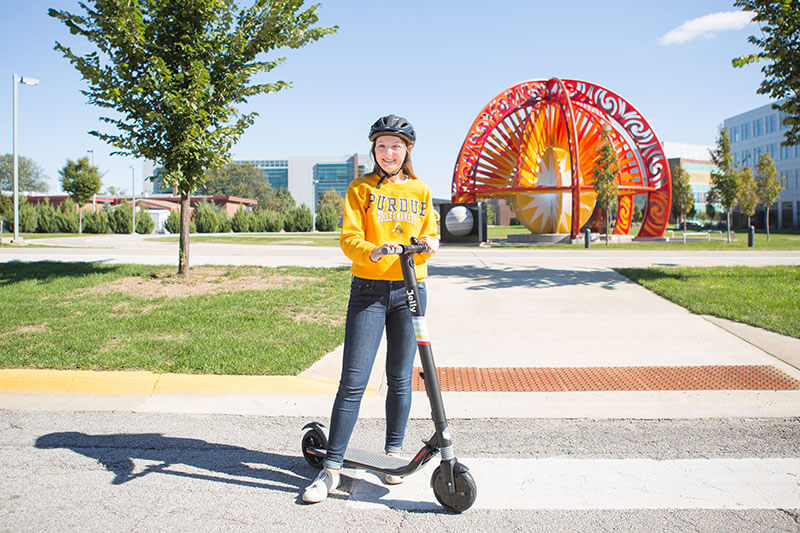October 23, 2018
E-scooters at Purdue are sweet as jelly
Scooters appearing on campus are part of a four-week engineering research project
WEST LAFAYETTE, Ind. — There's Jelly all over the place at Purdue.
Not the sticky spread, but a new e-scooter brand with a goofy name. And university officials are thrilled to see them. Seriously.
 Purdue civil engineering student Cassie McKee combines a favorite pastime with her research interest through a new Purdue University project. Purdue is thought to be the first university in the nation to conduct an academic study on the use of e-scooters. The goal of the research is to provide data to help public officials make informed decisions about the use of the new alternative transportation devices. (Purdue University photo/Bradley Milston)
Download image
Purdue civil engineering student Cassie McKee combines a favorite pastime with her research interest through a new Purdue University project. Purdue is thought to be the first university in the nation to conduct an academic study on the use of e-scooters. The goal of the research is to provide data to help public officials make informed decisions about the use of the new alternative transportation devices. (Purdue University photo/Bradley Milston)
Download image
That's because Jelly isn’t just yet another e-scooter brand, but the name given to a a campus-wide research project on best practices for using e-scooters. This is thought to be the first academic research to study how the oft-maligned e-scooters can best be incorporated into an urban environment.
In the coming weeks, 40 scooters will be distributed across Purdue's campus to begin the initial four-week research project. The research project is being led by Darcy Bullock, Purdue’s Lyles Family Professor of Civil Engineering and director of the Joint Transportation Research Program, which is operated out of Purdue’s Discovery Park.
Aaron Madrid, alternative transportation coordinator at Purdue, said e-scooters, if used properly, have the potential to reduce traffic congestion, free up parking, and reduce the amount of climate- influencing pollutants into the air.
"E-scooters are a nice, green transportation choice that helps address the 'last mile' problem in high population density environments where many people use public transit or park on the outer edge," Madrid said. "The scooters are already safer than motor vehicles, but this research will help us learn more about how to make their use even safer."
Although the research results are intended to be used by civil engineering and city planners worldwide, Madrid said Purdue will be using the information for future decisions about whether to allow scooters on campus and how they should be used.
"Any city planner or engineer looking for information on e-scooters has probably only seen negative news stories about companies dumping scooters in a city and creating chaos, or a sales pitch from one of the companies," Madrid said. "To have actual data about what does and does not work well will be invaluable."
To begin using the scooters, riders must first download the Jelly app from the Apple App Store. For this initial four-week portion of the project, the app is available only for Apple iOS. Anyone on campus can use the scooters, including campus visitors.
The app will show where scooters are located on campus and offer information on how to begin riding.
Cassie McKee, a senior civil engineering major who is working on the research project, already rides a longboard on campus, but she said she's eager to see another transportation option.
"They're fun, and the students like them," she said. "But as a civil engineering student, I'm hoping people will use them in an appropriate way. For example, it really annoys me when I see someone leave one so that it blocks the ADA ramp on a sidewalk."
Madrid said that the same rules and laws apply for e-scooters as for bicycles. They are not to be ridden on sidewalks or inside buildings, but they can safely be ridden on local bike infrastructure or multi-use paths.
He adds that if the e-scooters are ridden on the road, riders must operate them just as if they were driving a vehicle.
"Whether you are on a bicycle or an e-scooter, if you are operating it in the road — which the law allows — you have to obey all traffic laws. That means you have to stop at stop signs, wait in line at red lights, and use front and rear lights when it's dark," Madrid says.
"I should also remind other users of the road that scooters and bicycles are 100 percent allowed to use the road. You should not swerve at them, pass them in an unsafe manner, or yell and harass them. If you think the bicyclist or scooter rider is violating the law, you should inform the police. Let them handle the issue."
Writer: Steve Tally, 765-494-9809, steve@purdue.edu, @sciencewriter
Source: Aaron Madrid, 765-496-3825, madrida@purdue.edu
MEDIA CONTACTS: Steve Tally, 765-494-9809, steve@purdue.edu, @sciencewriter
Tim Doty, doty2@purdue.edu

